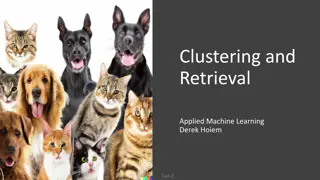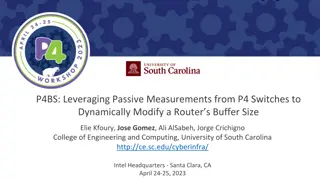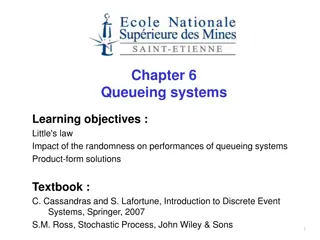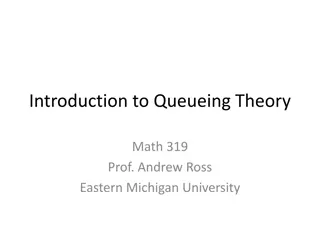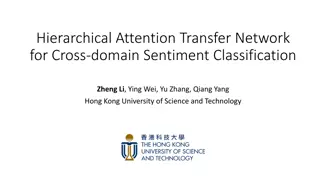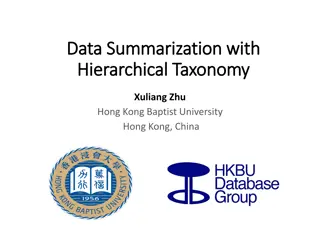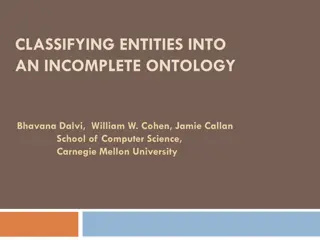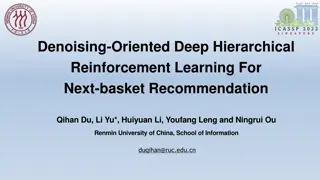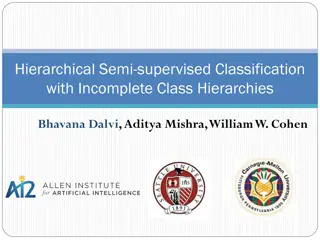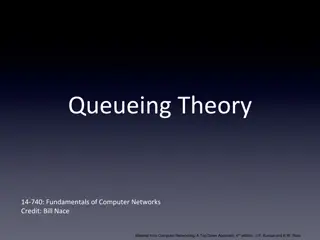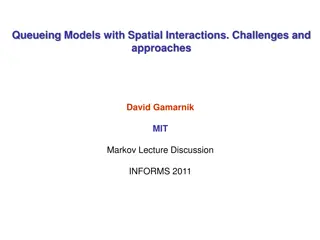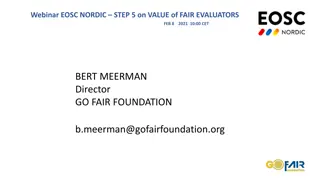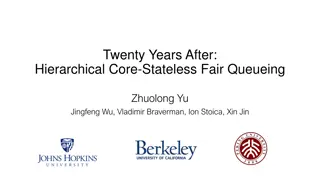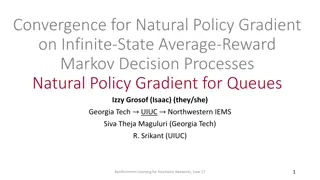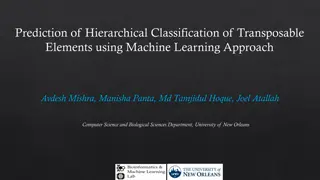Prioritizing Clinically Important Outcomes Using Hierarchical Win Ratio
Clinical trials often use composite outcomes, but conventional analysis methods have limitations in accurately reflecting clinical reality. Hierarchical outcomes offer flexibility by defining a hierarchy of events based on importance. Analyzing trials using hierarchical outcomes involves comparing p
7 views • 20 slides
System Modeling and Simulation Course Overview
This course covers the basics of systems modeling, discrete-event simulation, and computer systems performance evaluation. Topics include Monte Carlo simulation, probability models, simulation output analysis, queueing theory, and more. Professor Carey Williamson leads the course with a focus on pra
4 views • 21 slides
Understanding Clustering Algorithms: K-means and Hierarchical Clustering
Explore the concepts of clustering and retrieval in machine learning, focusing on K-means and Hierarchical Clustering algorithms. Learn how clustering assigns labels to data points based on similarities, facilitates data organization without labels, and enables trend discovery and predictions throug
1 views • 48 slides
Dynamic Buffer Sizing using Passive Measurements from P4 Switches
This study explores the dynamic modification of router buffer sizes by leveraging passive measurements from P4 switches. By dynamically adjusting buffer sizes based on factors like the number of long flows, average round-trip time, queueing delays, and packet loss rates, network performance can be o
3 views • 14 slides
Introduction to Queueing Systems and Applications
Explore the fundamentals of queueing systems, including Little's law, impacts of randomness, and product-form solutions. Delve into the history of queueing theory and its applications in traffic control, planning, and facility dimensioning. Understand the classification and characteristics of simple
0 views • 90 slides
Understanding Queueing Theory: Applications and Notations
Queueing theory is a mathematical study focused on predicting wait times and server configuration in systems with queues, such as telephone call centers, factories, and air travel. This theory helps in optimizing service levels and resource allocation to minimize waiting times and enhance efficiency
1 views • 32 slides
Understanding Fair Trade and the WFTO Guarantee System
Fair Trade is a trading partnership that aims for equity in international trade, offering better conditions for marginalized producers. The WFTO (World Fair Trade Organization) provides internationally recognized verification, assessing social enterprises rigorously. There are costs associated with
0 views • 10 slides
Understanding Disparate Impact Claims in Fair Housing Cases
A presentation by the Intermountain Fair Housing Council covers recent federal cases related to fair housing, including the pivotal Texas Department of Housing case. The discussion includes insights on disparate impact analysis and the crucial role of such claims in enforcing the Affirmatively Furth
0 views • 20 slides
Fair and Alternative Trade: A Path to Ethical Consumption
Fair Trade and Alternative Trade practices aim to create a more equitable and just global marketplace. Fair Trade focuses on fair prices and relationships for producers, while Alternative Trade emphasizes partnership and respect between producers and consumers. Through these approaches, consumers ca
0 views • 19 slides
Understanding FAIR Data and DDI - Implementing Data Sharing Best Practices
Explore the concepts of FAIR data and DDI, essential for sharing research data effectively. Learn how the Data Documentation Initiative (DDI) supports FAIR principles and enhances data quality. Engage in interactive quizzes to test your knowledge on FAIR practices.
1 views • 38 slides
Design and Evaluation of Hierarchical Rings with Deflection Routing
This research explores the implementation of Hierarchical Rings with Deflection (HiRD) routing as a solution to the performance and energy inefficiencies found in traditional hierarchical ring designs. HiRD guarantees livelock freedom and efficient delivery while simplifying the network structure by
0 views • 52 slides
Parent Seminars on Admission Arrangements for Nursery Classes in KGs for the 2019/20 School Year
Government-led initiatives have ushered in a new kindergarten education scheme, impacting K1 admission arrangements. Objectives include streamlining enrollment processes, reducing queueing, and aiding parents in securing timely placements. Details cover KGs involved, measures taken, and enhanced sup
0 views • 45 slides
Creating Second Hierarchical Data Table in Windchill PDMLink
Learn how to set up a second hierarchical data table in Windchill PDMLink by selecting rows from the first table to view and interact with related objects in a structured manner. The process involves customization and user actions within the tables to manage parts and documents efficiently.
0 views • 8 slides
Hierarchical Attention Transfer Network for Cross-domain Sentiment Classification
A study conducted by Zheng Li, Ying Wei, Yu Zhang, and Qiang Yang from the Hong Kong University of Science and Technology on utilizing a Hierarchical Attention Transfer Network for Cross-domain Sentiment Classification. The research focuses on sentiment classification testing data of books, training
0 views • 28 slides
Data Summarization with Hierarchical Taxonomy: Motivations and Examples
The research discusses the use of Hierarchical DAGs in summarizing data with a focus on disease ontology and animal diseases. It explores how general concepts can summarize specific items and their relationships. The study also presents motivated examples of popular papers summarization in SIGMOD, s
0 views • 27 slides
Classifying Entities into an Incomplete Ontology: Exploratory EM Approach
The research discusses methods for hierarchical classification of entities into incomplete ontologies. It explores the challenges of evolving web-scale datasets and the need for classifying entities in an incomplete ontology structure. The Hierarchical Exploratory EM model is detailed, providing ins
0 views • 27 slides
Denoising-Oriented Deep Hierarchical Reinforcement Learning for Next-basket Recommendation
This research paper presents a novel approach, HRL4Ba, for Next-basket Recommendation (NBR) by addressing the challenge of guiding recommendations based on historical baskets that may contain noise products. The proposed Hierarchical Reinforcement Learning framework incorporates dynamic context mode
0 views • 16 slides
Hierarchical Semi-Supervised Classification with Incomplete Class Hierarchies
This research explores the challenges and solutions in semi-supervised entity classification within incomplete class hierarchies. It addresses issues related to food, animals, vegetables, mammals, reptiles, and fruits, presenting an optimized divide-and-conquer strategy. The goal is to achieve semi-
0 views • 18 slides
Understanding Queueing Theory in Computer Networks
Queueing theory is a powerful analytic tool used to analyze performance in queueing processes, applicable in various industries including retail, manufacturing, and computer networks. It involves studying characteristics such as arrival patterns, service patterns, and queue disciplines to make perfo
0 views • 61 slides
Spatial Interactions in Queueing Models: Challenges and Approaches
Explore the complexities of queueing models with spatial interactions, delving into loss models, stability questions, and performance analyses. Researchers tackle the stability of systems based on job sizes and arrival rates in various scenarios. Discover insights from statistical physics and the qu
0 views • 11 slides
FAIRsFAIR.INFRAEOSC.5c.call Proposal Summary
FAIR uptake and compliance in all scientific communities, coordinate initiatives across member states and associated countries, develop and implement measures on FAIR data policies, support organization and participation on FAIR uptake and compliance, support the co-development and implementation of
0 views • 42 slides
Webinar on Value of FAIR Evaluators in EOSC-Nordic Step 5
Discover the importance of FAIR Evaluators in the EOSC-Nordic Step 5 webinar series. Learn about the assessment process, key takeaways, and insights on FAIR data and its implications. Join Bert Meerman, Director of GO FAIR Foundation, as he delves into the significance of machine actionability and t
0 views • 5 slides
ChildFund International Innovation Fair - Pathways for Value, Impact, and Growth
ChildFund International Innovation Fair will take place on November 12-13, 2018 in Richmond, Virginia. The 2-day event aims to capture innovations across the organization and design fair activities that support sustainability. Participants, including Ambassadors and Champions, will create action pla
0 views • 7 slides
Idaho Fair Housing Month Social Media Campaign - Building Awareness Together
Join us for Idaho Fair Housing Month as we raise awareness about fair housing laws, protected classes, tenant rights, and landlord responsibilities. Learn how to file complaints, understand reasonable accommodations, and access resources to address common barriers in fair housing. Follow #IdahoFairH
0 views • 5 slides
Understanding FAIR Principles in Biomedical Research
The FAIR principles - Findable, Accessible, Interoperable, and Reusable - provide a framework for ensuring scientific data in biomedical research is managed and shared effectively. This informative session delves into the theory and practice of FAIR principles, emphasizing the importance of data qua
0 views • 28 slides
Understanding Fair Housing Laws: Essentials and Protections
Explore the essentials of fair housing laws, including protected classes, covered entities, prohibited conduct, illegal behaviors, and discriminatory advertising. Learn about CNY Fair Housing's role in investigating housing discrimination and providing legal representation, as well as the specific c
0 views • 25 slides
Overview of Fair Cost of Care Initiative in West Sussex
The Fair Cost of Care initiative in West Sussex aims to address the challenges faced by care providers in a shrinking budget environment. Local authorities are required to conduct a Cost of Care Exercise and develop a Market Sustainability Plan to ensure fair costs for care services. The government'
0 views • 39 slides
Core-Stateless Fair Queueing: Past, Present, and Future
Fair queueing, a fundamental mechanism for fair bandwidth allocation in networks, has evolved over the years. Core-Stateless Fair Queueing (CSFQ), proposed two decades ago, offers a stateless solution but faces challenges for widespread adoption in data centers. The need for hierarchical fair queuei
0 views • 22 slides
ProTech Contracts: Fair Opportunity and Guidance
ProTech services consist of multiple-award contracts under five domains. Fair Opportunity is the standard for competition in task order contracts. Contractors must be given a fair opportunity for consideration. The process should be fair, planned, and well-documented. The Traditional Fair Opportunit
0 views • 14 slides
Building Hierarchical Ratings Model without Alternatives Listed
Learn to build a hierarchical ratings model with 4 criteria, including subcriteria for Comfort, using a step-by-step approach. Explore how to select covering criteria, create performance scales, add and rate alternatives, and prioritize rating intensities for effective evaluation. Streamline your ra
0 views • 12 slides
Efficient and Effective Duplicate Detection in Hierarchical Data
This study explores the efficient and effective detection of duplicates in hierarchical data, focusing on fuzzy duplicates and hierarchical relationships in XML. It discusses the current and proposed systems, including the use of Bayesian networks for similarity computations. The methods involve vec
0 views • 25 slides
Understanding Fair Comment Defense in Scottish Law
Fair comment is a common law defense in Scots law that facilitates freedom of speech by allowing opinions on matters of public interest. Compared to English law, Scotland has different approaches to defamation, with the Defamation Act 2013 mostly applying to England and Wales. The defense of fair co
0 views • 7 slides
Reinforcement Learning for Queueing Systems
Natural Policy Gradient is explored as an algorithm for optimizing Markov Decision Processes in queueing systems with unknown parameters. The challenges of unknown system dynamics and policy optimization are addressed through reinforcement learning techniques such as Actor-critic and Trust Region Po
0 views • 20 slides
Graph Summarization on Hierarchical DAGs
Explore top-k graph summarization techniques on Hierarchical Directed Acyclic Graphs (DAGs) like Disease Ontology, ImageNet, and Wikipedia Categories. Understand motivations for summarization, related works, and the kDAG-Problem. Discover algorithms, experiments, and conclusions for efficient graph
0 views • 38 slides
Understanding Protected Classes and Fair Housing Laws in the Workplace
Learn about the federal 7 protected classes, state and local protected classes, and key guidelines for leasing staff to ensure fair housing compliance. Understand what constitutes familial status, national origin, and disability. Educate your team on Grace Hill Fair Housing training and ensure adher
0 views • 34 slides
Understanding Hierarchical vs. Non-Hierarchical Models in Computer Graphics
Dive into the concepts of hierarchical and non-hierarchical modeling in computer graphics. Explore how hierarchical models represent complex objects with explicit sub-part dependencies, while non-hierarchical models treat objects independently. Understand the benefits and challenges of each approach
0 views • 30 slides
Utilizing Bayesian Hierarchical Model for Clinical Trial Quality Design
Explore how a Bayesian Hierarchical Model can be leveraged to design quality into clinical trials and ensure compliance with ICH E6 R2 Quality Tolerance Limits. Learn about the Risk-Based approach, Quality Tolerance Limits methodology, and the application of Bayesian modeling for early phase studies
0 views • 14 slides
Overview of KBase and HTCondor Integration for Systems Biology Predictions
KBase is an open software platform for systems biology, offering predictive and design capabilities for biological functions. It integrates data and analytical tools for genomics research of microbes, plants, and their communities. HTCondor is chosen for fair queueing and resource limit settings due
0 views • 12 slides
Hierarchical Body Modeling in OpenGL Homework 3
Explore the concepts of hierarchical body modeling in OpenGL Homework 3 by creating body part hierarchies, recording transformation matrices, and understanding the hierarchy structures. The homework focuses on building hierarchies for body parts like thighs and shanks, applying transformations, and
0 views • 23 slides
Machine Learning Approach for Hierarchical Classification of Transposable Elements
This study presents a machine learning approach for the hierarchical classification of transposable elements (TEs) based on pre-annotated DNA sequences. The research includes data collection, feature extraction using k-mers, and classification approaches. Proper categorization of TEs is crucial for
0 views • 18 slides


